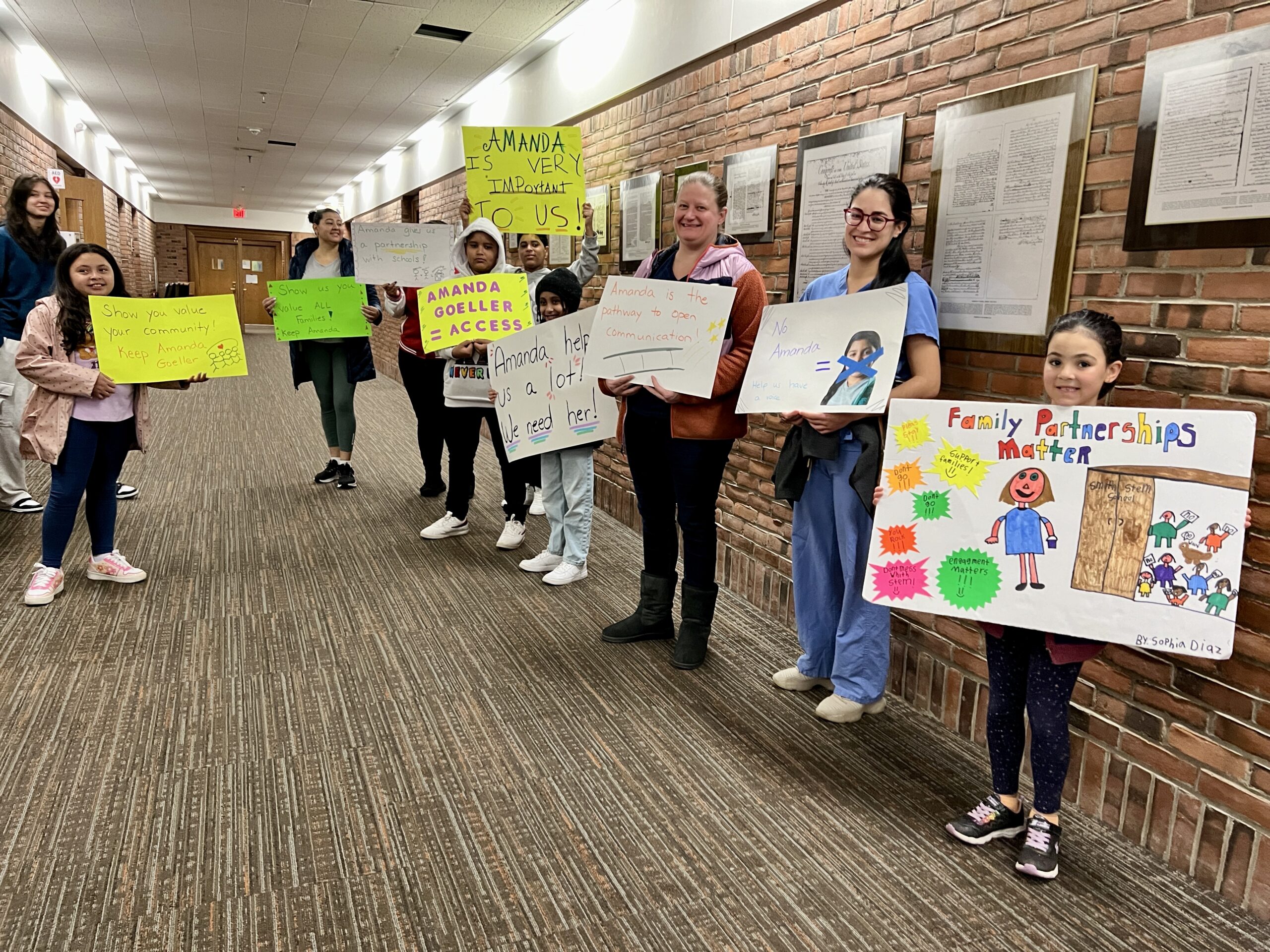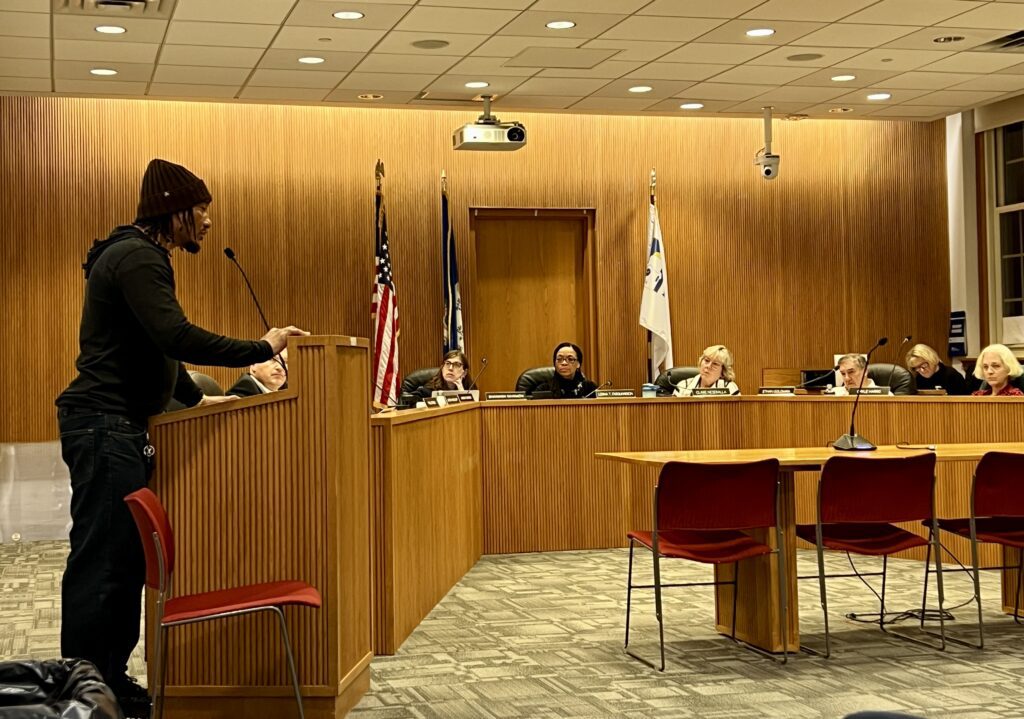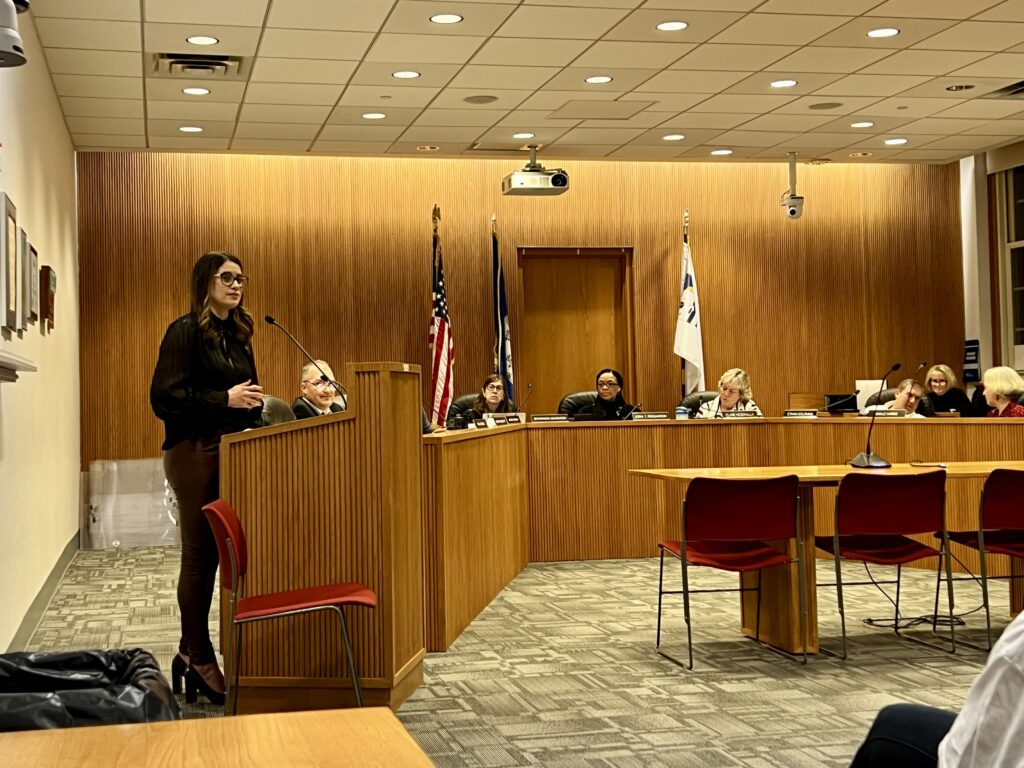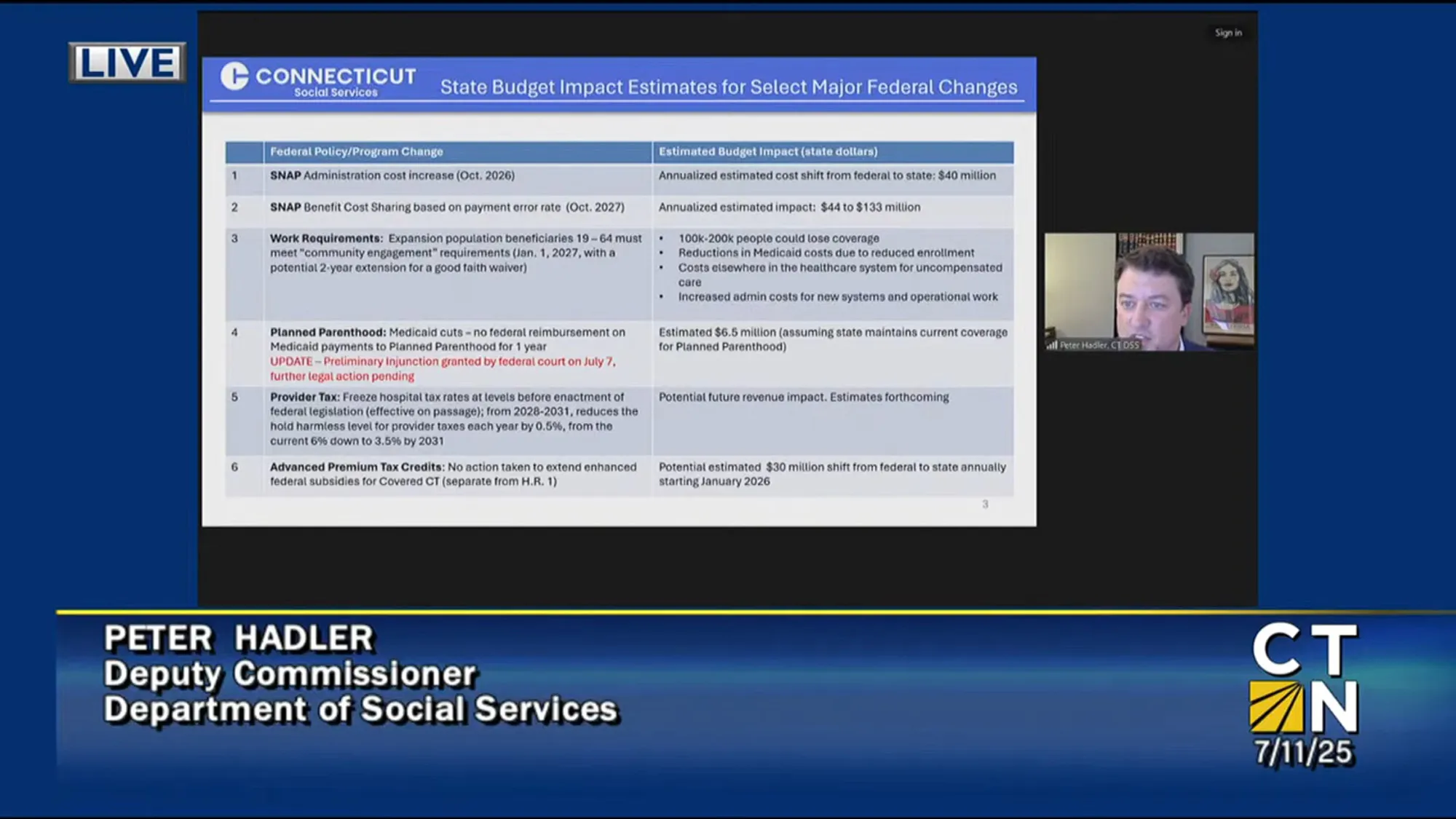Residents Make Plea to Board of Ed for Retention of Family and Community Engagement Role, Class Size Limits

Audio By Carbonatix

Prior to the Board of Education budget hearing, residents advocated for keeping the role held by Amanda Goeller. Photo credit: Ronni Newton
The West Hartford Board of Education held a hearing Wednesday night, and is scheduled to vote Thursday, April 4 on the budget for the 2024-2024 academic year.
By Ronni Newton
Nearly two dozen speakers addressed the West Hartford Board of Education at a public hearing on the budget Wednesday night, with most focused on two separate topics – the proposed elimination of a “family and community engagement coordinator” position for Smith STEM and Charter Oak International Academy and large class sizes at Duffy Elementary School.
Prior to the commencement of the 7 p.m. hearing, supporters of Amanda Goeller – pictured above – gathered in the hallway outside Council chambers with posters that they also held up inside the packed room, putting the signs down as the hearing began in accordance with proper protocol.
Superintendent of Schools Paul Vicinus proposed the budget for the 2024-2025 school year on March 5 – a $201,303,856 budget that represents an overall increase of $11,112,735 (or 5.8%) over the current year’s budget. Federal funds provided to the district in response to the pandemic – roughly $9.7 million in ESSER (the Elementary and Secondary School Emergency Relief grants) – had supported various programs as well as the hiring of additional staff with funds that were outside of the district’s general fund budget and ESSER funding sunsets as of the upcoming academic year.
Goeller’s position as family and community engagement coordinator – which Vicinus said is a home-school liaison role shared by the Charter Oak and Smith STEM communities – was one of the positions funded by ESSER that was not added to the general fund budget.
Prior to the availability of ESSER funding, Goeller had worked for the district as an hourly employee, funded by another grant, but her position was deemed critical in the wake of the pandemic and elevated to full-time through the ESSER funds.
Some community members who testified about maintaining Goeller’s position noted that Smith STEM, in particular, now has far more multi-lingual families than any other school, including many whose native language is Portuguese. Goeller, who is also an immigrant and speaks Portuguese fluently and also is able to translate Spanish, helps families at both schools with language-related matters as well as navigating not only school-related requirements but also helps them access the country’s complicated health care system and helps them manage other issues and responsibilities.

José Moreira speaks to the Board of Education on March 27, 2024. Photo credit: Ronni Newton
José Moreira is a Smith STEM parent and a native of Brazil, and he addressed the Board of Education in Portuguese. Although Board members may not have understood everything he said, the emotion was clearly evident and he occasionally paused to wipe away tears.
Sandra Felicissimo, ESOL teacher at Smith STEM, said 80 of Smith’s 349 students are in the ESOL program, 31 of whom speak Portuguese. She provided the following translation of Moreira’s testimony for We-Ha.com:
Hi, My name is José Moreira, I reside in West Hartford. I have two children who attend West Hartford Schools, Iasmim and Samuel. I’m here to represent the Brazilian population and emphasize the importance of Amanda for the Brazilian community to which she has given so much love and care. I know that many parents wanted to be here in this moment but unfortunately couldn’t get here because they have to work harder. Us immigrants have to work in order to take care of our families. I honor God and am so thankful for Amanda’s position in the schools and for all of the teachers. I see everything in my home, through seeing my children who are doing so well in the period of time they have been in West Hartford schools. And with Amanda’s guidance supporting the Brazilian community. I can see several Brazilian faces here and I hope they are being well represented by my emotion at this moment. I know that at times, human emotions don’t change things but I think that this country is a country of opportunity and liberty [points to flag]. I thank you all for giving me this right of defending the right of my family, the right of my children to grow up and be someone someday. The Brazilians who are present are not exclusively here because of Amanda, but they came to defend and go after their children’s right to grow up and be someone in this country. Maybe one day I will be able to see a child of mine have the education that I don’t have. And they could be sitting in a chair that I’ve never sat in. [Pointed at BOE member seats.] Everyone present here has a story to tell. I have a big story that started when I first came to this country and Amanda has always helped me. When my home flooded, she was there for us. My son was born, and she was there again and supported us by getting him a car seat through the West Hartford Police Department. Amanda has always looked out for the Brazilian Community. We are a financially limited community. When December comes, I can see the joy in the faces of my children and in the faces of other children … [referring to holiday gifts given out to families in need…but gets cut off due to time constraint] … Ok, thank you.”
Felicissimo also addressed the Board regarding Goeller, whose role, she said, is “more than a translator” and is vital to helping families in the community. “I urge you to reconsider the cutting of Amanda’s hours,” she said, noting that retaining the full-time role is important so the families served can continue to thrive.
Viviane Rinaldi told the Board that the families who are helped by Goeller come from a different system and culture, and scaling her role back will have an adverse impact on lower income families in the community who are the most vulnerable. “We need to be fair. We are going backwards,” she said.

Amanda Goeller speaks to the Board of Education on March 27, 2024. Photo credit: Ronni Newton
Goeller herself told the Board that she forms personal connections that are beyond just being an interpreter. “Navigating, understanding, and getting used to our complex system is not easy,” she said, noting how difficult it is to make a doctor’s appointment if you don’t speak the language, or have health insurance or a social security number. Many of the families she serves do not have access to a car, or a cellphone, and also face food insecurity. “This is clearly an equity issue and that is why the family and community engagement coordinator is critical,” Goeller said.
Iasmim Moreira, José’s daughter, said Goeller helped her family from the very beginning when they arrived from Brazil. She has been their connection and is helping them realize their dreams, and also helped her family and others when their apartment complex flooded. “Our families need her, the community needs her, and we need her,” Iasmim said.
A number of parents from Duffy Elementary School also addressed the Board, including Sarah Dolan sho said she was specifically advocating for smaller class sizes than included in the current budget. With multiple societal factors continuing to impact behavior, “class size is the most important piece of that magic,” she said.
Molly Towne, also a Duffy parent, said there is not equity across the district with respect to class sizes. Duffy’s fourth and fifth grade – a total of six sections – will account for half of the district’s 24-student classes according to enrollment projections for 2024-2025, she said.
Duffy parent Stephanie Dominello distributed a bar graph and other statistics to Board members and the audience, noting that Duffy has the same number of proposed sections for next year as Charter Oak (22), but 63 more students. Her handout notes that Duffy is projected to average 21.4 students per class for K-grade 3, vs. 19.0 per class elsewhere in the district, and 24.3 students per class for fourth and fifth grade, vs. 21.0 for the rest of the district. She urged the Board “to take a more thoughtful approach to determining class sizes.”
Jeff Kivlin, who is a Duffy parent, said that after listening to the other testimony, the large class sizes are not the only issue. In a district that prides itself on attention to DEI, he said he was “dumbfounded” to hear about the elimination of Goeller’s position. He challenged the Board to add to its budget, to save the counselors, to add more teachers. “Challenge the Town Council,” he urged. “Do we need more bike lanes or would we rather have better schools? … Mental health is a crisis and you are going to eliminate all the counselors. … Do we need a $66 million community center or do we need more teachers?”
The seven elementary school counselors referenced by Kivlin and other speakers had also been funded through ESSER. Those positions are not in the proposed general fund budget.
The Board held its second budget workshop after the roughly 75-minute hearing ended. While Board members are not permitted to respond to speakers at a public hearing, they did obtain some clarification from Vicinus and other members of the administrative team during the workshop regarding issues raised at the hearing.
Anne McKernan, assistant superintendent for Curriculum, Assessment and Instruction, said the district will be seeking grant funding through Title III as well as other immigrant grant sources to fund Goeller’s work, “although not at the current level.”
Liz Hewitt, the district’s director of Finance and Planning, estimated the total cost of Goeller’s position at $85,000, including salary and benefits.
In a phone interview Thursday with We-Ha.com, Vicinus confirmed that “other grant support” is being actively sought for supporting as much as possible of Goeller’s position, and said there may also be funding through Title IV.
Regarding class sizes, Vicinus said the sections at all schools fall within then Board-set guidelines of 23 students or less for grades K-3 and 27 students or less for grades 4 and 5. Guidelines for the magnet schools, Smith and Charter Oak, provide for two fewer students per section.
Students don’t fall uniformly across our schools, Vicinus said, which is “entirely a function of the neighborhoods.” When the lower grades reach more than 23 students per class, they are broken into another section, but the way the cohorts are at Duffy at this time, the projections are for the average class sizes to be larger than the district average.
Vicinus said during the workshop that if there were to be class size guidelines of fewer than 20, that would require 40 more teachers district-wide, which would be “relatively untenable not only for the cost, and also for the space.” At a class size of 22 or lower, 18-20 FTEs would be required and space would also be a concern. To get to 23 or lower for grades 4-5, between five and eight additional FTEs would be needed, and even setting the limit at 25 would add a minimum of four FTEs at Duffy alone, and the guideline would also impact the rest of the district. He did acknowledge that “it is absolutely true when you look at Duffy’s cohorts, you can see a number of cohorts approaching [the current] size guidelines.”
In addition, Assistant Superintendent for Administration Andy Morrow noted that Duffy will already have a space crunch next year as the air quality improvement project will be underway and will require use of several portable classrooms that will be set up in the courtyard, which classes will utilize on a rotating basis.
Vicinus said the only solution to Duffy’s issue of class size might be redistricting, but that’s another conversation and not sure that’s what the families want.
According to Vicinus, the projections of class sizes for grades 4 and 5 don’t vary much since the size of the cohorts in the younger grades are known, and there is also not much movement in the real estate market in town.
The Board of Education will meet at 7 p.m. on Thursday, April 4 to adopt its budget.
There is some good news regarding health insurance premiums, with the renewal coming in lower than projected, Hewitt said. That should allow a roughly $250,000 reduction in the budget, which Vicinus said will be incorporated on April 4 as an amendment to the West Hartford Public Schools budget.
The detailed budget is available on the West Hartford Public Schools website. Suggestions can be sent to [email protected].
The Board of Education budget is part of the town’s overall general fund budget, and while the Council can change the overall amount allocated to the district, it cannot adjust specific items of the education budget.
Just one person spoke at a Town Council public hearing on the budget held Tuesday evening. One more hearing will be held, at 2 p.m. on Wednesday, April 3. The Town Council is set to adopt the budget on Wednesday, April 24, at 7:30 p.m.
Like what you see here? Click here to subscribe to We-Ha’s newsletter so you’ll always be in the know about what’s happening in West Hartford! Click the blue button below to become a supporter of We-Ha.com and our efforts to continue producing quality journalism.




[…] a public hearing on March 27, roughly two dozen people addressed the Board, with most asking the Board not to eliminate the […]